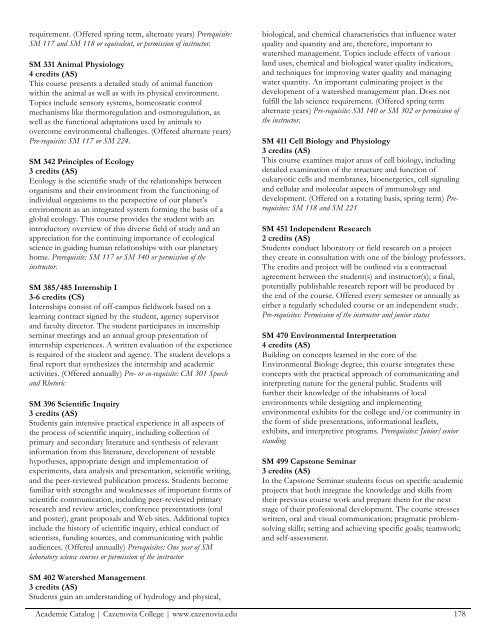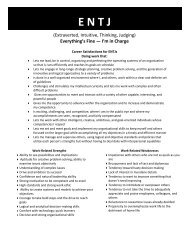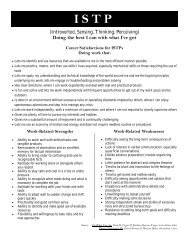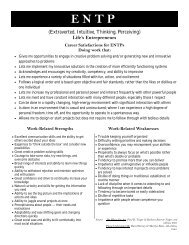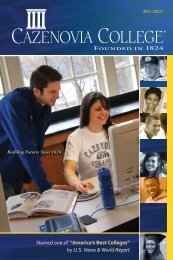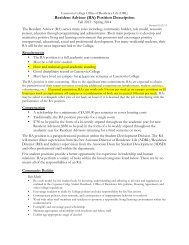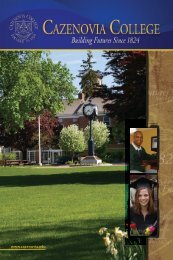of
2013-14 Academic Catalog - Cazenovia College
2013-14 Academic Catalog - Cazenovia College
- No tags were found...
Create successful ePaper yourself
Turn your PDF publications into a flip-book with our unique Google optimized e-Paper software.
equirement. (Offered spring term, alternate years) Prerequisite:<br />
SM 117 and SM 118 or equivalent, or permission <strong>of</strong> instructor.<br />
SM 331 Animal Physiology<br />
4 credits (AS)<br />
This course presents a detailed study <strong>of</strong> animal function<br />
within the animal as well as with its physical environment.<br />
Topics include sensory systems, homeostatic control<br />
mechanisms like thermoregulation and osmoregulation, as<br />
well as the functional adaptations used by animals to<br />
overcome environmental challenges. (Offered alternate years)<br />
Pre-requisite: SM 117 or SM 224.<br />
SM 342 Principles <strong>of</strong> Ecology<br />
3 credits (AS)<br />
Ecology is the scientific study <strong>of</strong> the relationships between<br />
organisms and their environment from the functioning <strong>of</strong><br />
individual organisms to the perspective <strong>of</strong> our planet’s<br />
environment as an integrated system forming the basis <strong>of</strong> a<br />
global ecology. This course provides the student with an<br />
introductory overview <strong>of</strong> this diverse field <strong>of</strong> study and an<br />
appreciation for the continuing importance <strong>of</strong> ecological<br />
science in guiding human relationships with our planetary<br />
home. Prerequisite: SM 117 or SM 140 or permission <strong>of</strong> the<br />
instructor.<br />
SM 385/485 Internship I<br />
3-6 credits (CS)<br />
Internships consist <strong>of</strong> <strong>of</strong>f-campus fieldwork based on a<br />
learning contract signed by the student, agency supervisor<br />
and faculty director. The student participates in internship<br />
seminar meetings and an annual group presentation <strong>of</strong><br />
internship experiences. A written evaluation <strong>of</strong> the experience<br />
is required <strong>of</strong> the student and agency. The student develops a<br />
final report that synthesizes the internship and academic<br />
activities. (Offered annually) Pre- or co-requisite: CM 301 Speech<br />
and Rhetoric<br />
SM 396 Scientific Inquiry<br />
3 credits (AS)<br />
Students gain intensive practical experience in all aspects <strong>of</strong><br />
the process <strong>of</strong> scientific inquiry, including collection <strong>of</strong><br />
primary and secondary literature and synthesis <strong>of</strong> relevant<br />
information from this literature, development <strong>of</strong> testable<br />
hypotheses, appropriate design and implementation <strong>of</strong><br />
experiments, data analysis and presentation, scientific writing,<br />
and the peer-reviewed publication process. Students become<br />
familiar with strengths and weaknesses <strong>of</strong> important forms <strong>of</strong><br />
scientific communication, including peer-reviewed primary<br />
research and review articles, conference presentations (oral<br />
and poster), grant proposals and Web sites. Additional topics<br />
include the history <strong>of</strong> scientific inquiry, ethical conduct <strong>of</strong><br />
scientists, funding sources, and communicating with public<br />
audiences. (Offered annually) Prerequisites: One year <strong>of</strong> SM<br />
laboratory science courses or permission <strong>of</strong> the instructor<br />
biological, and chemical characteristics that influence water<br />
quality and quantity and are, therefore, important to<br />
watershed management. Topics include effects <strong>of</strong> various<br />
land uses, chemical and biological water quality indicators,<br />
and techniques for improving water quality and managing<br />
water quantity. An important culminating project is the<br />
development <strong>of</strong> a watershed management plan. Does not<br />
fulfill the lab science requirement. (Offered spring term<br />
alternate years) Pre-requisite: SM 140 or SM 302 or permission <strong>of</strong><br />
the instructor.<br />
SM 411 Cell Biology and Physiology<br />
3 credits (AS)<br />
This course examines major areas <strong>of</strong> cell biology, including<br />
detailed examination <strong>of</strong> the structure and function <strong>of</strong><br />
eukaryotic cells and membranes, bioenergetics, cell signaling<br />
and cellular and molecular aspects <strong>of</strong> immunology and<br />
development. (Offered on a rotating basis, spring term) Prerequisites:<br />
SM 118 and SM 221<br />
SM 451 Independent Research<br />
2 credits (AS)<br />
Students conduct laboratory or field research on a project<br />
they create in consultation with one <strong>of</strong> the biology pr<strong>of</strong>essors.<br />
The credits and project will be outlined via a contractual<br />
agreement between the student(s) and instructor(s); a final,<br />
potentially publishable research report will be produced by<br />
the end <strong>of</strong> the course. Offered every semester or annually as<br />
either a regularly scheduled course or an independent study.<br />
Pre-requisites: Permission <strong>of</strong> the instructor and junior status<br />
SM 470 Environmental Interpretation<br />
4 credits (AS)<br />
Building on concepts learned in the core <strong>of</strong> the<br />
Environmental Biology degree, this course integrates these<br />
concepts with the practical approach <strong>of</strong> communicating and<br />
interpreting nature for the general public. Students will<br />
further their knowledge <strong>of</strong> the inhabitants <strong>of</strong> local<br />
environments while designing and implementing<br />
environmental exhibits for the college and/or community in<br />
the form <strong>of</strong> slide presentations, informational leaflets,<br />
exhibits, and interpretive programs. Prerequisites: Junior/senior<br />
standing<br />
SM 499 Capstone Seminar<br />
3 credits (AS)<br />
In the Capstone Seminar students focus on specific academic<br />
projects that both integrate the knowledge and skills from<br />
their previous course work and prepare them for the next<br />
stage <strong>of</strong> their pr<strong>of</strong>essional development. The course stresses<br />
written, oral and visual communication; pragmatic problemsolving<br />
skills; setting and achieving specific goals; teamwork;<br />
and self-assessment.<br />
SM 402 Watershed Management<br />
3 credits (AS)<br />
Students gain an understanding <strong>of</strong> hydrology and physical,<br />
Academic Catalog | Cazenovia College | www.cazenovia.edu 178


